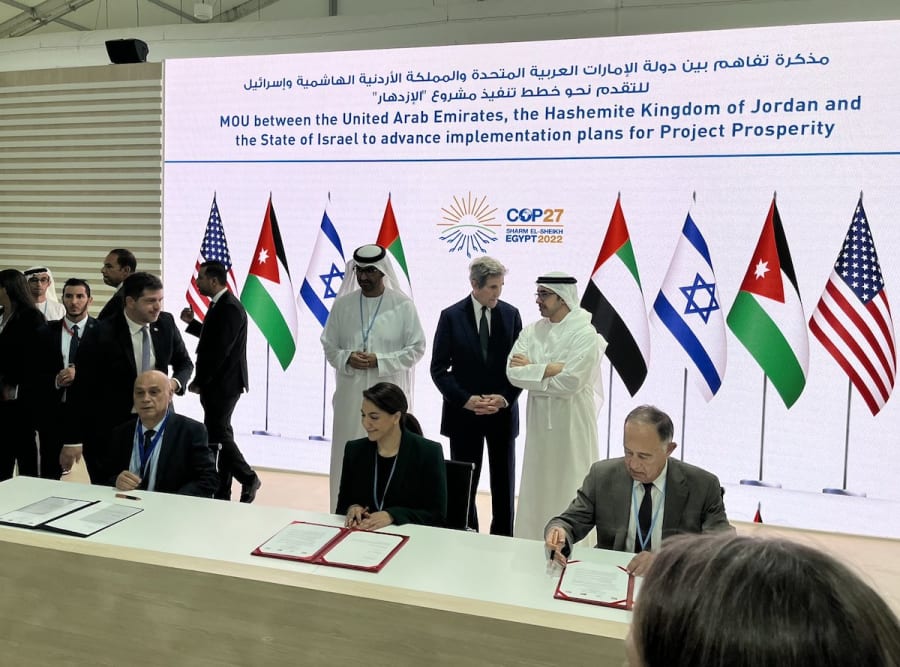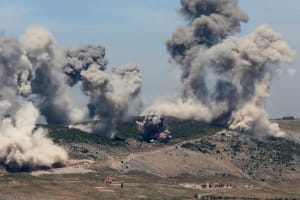Israel, Jordan, UAE replace ‘intent’ with ‘commitment’ to solar energy, desalination exchange
The UAE-brokered deal was raised at the UN’s COP27 conference in Sharm el-Sheikh

Israel, Jordan and the United Arab Emirates signed an upgraded memorandum of understanding on Tuesday, promising to pursue a trilateral desalination-and-solar project before next year’s COP28 climate change conference.
The UAE-brokered deal, signed last November at the Dubai Expo, expressed Jordan’s intention to provide Israel with solar energy in exchange for desalinated water.
According to the agreement, a UAE company would build a solar farm in Jordan and deliver 600 megawatts of electricity to Israel. In turn, Israel would supply Jordan with up to 200 million cubic meters of desalinated water.
Israel’s outgoing Regional Cooperation Minister Esawi Frej, Jordanian Minister of Water and Irrigation Mohammad al-Najjar and UAE Climate Change and Environment Minister Mariam Almheiri this week signed an updated MoU during the United Nations’ COP27 Climate Change Conference in Sharm el-Sheikh, Egypt.
Whereas the Dubai Expo 2021 memorandum only expressed “intent,” the updated commitment makes it clear that the three countries are working “to develop the necessary implementations in time for COP28.” The UAE will host the U.N.’s 28th Conference of the Parties’ Convention on Climate Change next November.
Feasibility studies for the solar power and desalination projects have been ongoing since the signing of the first MoU; the agreement is expected to be mutually beneficial for Jordan and Israel.
Landlocked Jordan consists mostly of desert and is ranked as one of the most water-deficient countries in the world. While 60% of Israel’s territory is desert, the Start-Up Nation has overcome this natural obstacle by developing cutting-edge technologies which have turned it into a water-exporting country.
Cooperation on solar energy and desalination represents one of several multinational platforms for development that materialized after Israel, the UAE and Bahrain signed the historic Arab-Israeli Abraham Accords at an official White House ceremony in 2020. The agreement, which was brokered by the former Trump administration, eventually expanded to include Morocco and Sudan.
Despite U.S. President Joe Biden’s administration pledge to expand the Abraham Accords, no new normalization deals between Israel and an Arab state have been signed during his tenure.
While Israeli leaders have recognized a path to peace and stability in the region, Biden has said the Abraham Accords do not constitute a replacement for the stalled peace process between Israel and the Palestinian Authority.
Amid ongoing tensions, Israel’s outgoing Environmental Protection Minister Tamar Zandberg met with Mohammad Shtayyeh – who was appointed prime minister of the P.A. in 2019 – during the climate conference.
Zandberg also attended meetings with ministers from Lebanon and Iraq, two Arab states that are still officially at war with Israel. However, the Israeli minister urged the countries to unite against what Israeli President Isaac Herzog called on Monday an imminent climate “catastrophe.”
“With studies forecasting imminent, severe consequences for our region, the Middle East is on the brink of catastrophe,” Herzog said in his speech, referring to studies that show that both the Middle East and North Africa are enduring global warming at twice the rate of the worldwide average.
Zandberg doubled down on the urgent need to cooperate against the threat.
“The countries of the region share the warming and drying climate, and just as they share the problems, they can and should share the solutions,” Zandberg said. “No country will be able to withstand the climate crisis alone, and a joint effort by the countries of the region to share preparation and adaptation solutions is the most important thing for the coming years.”
For years, researchers have warned that the world’s temperatures are rising. The Middle East is a particularly vulnerable region due to its already high temperatures and largely arid climate.

The All Israel News Staff is a team of journalists in Israel.













